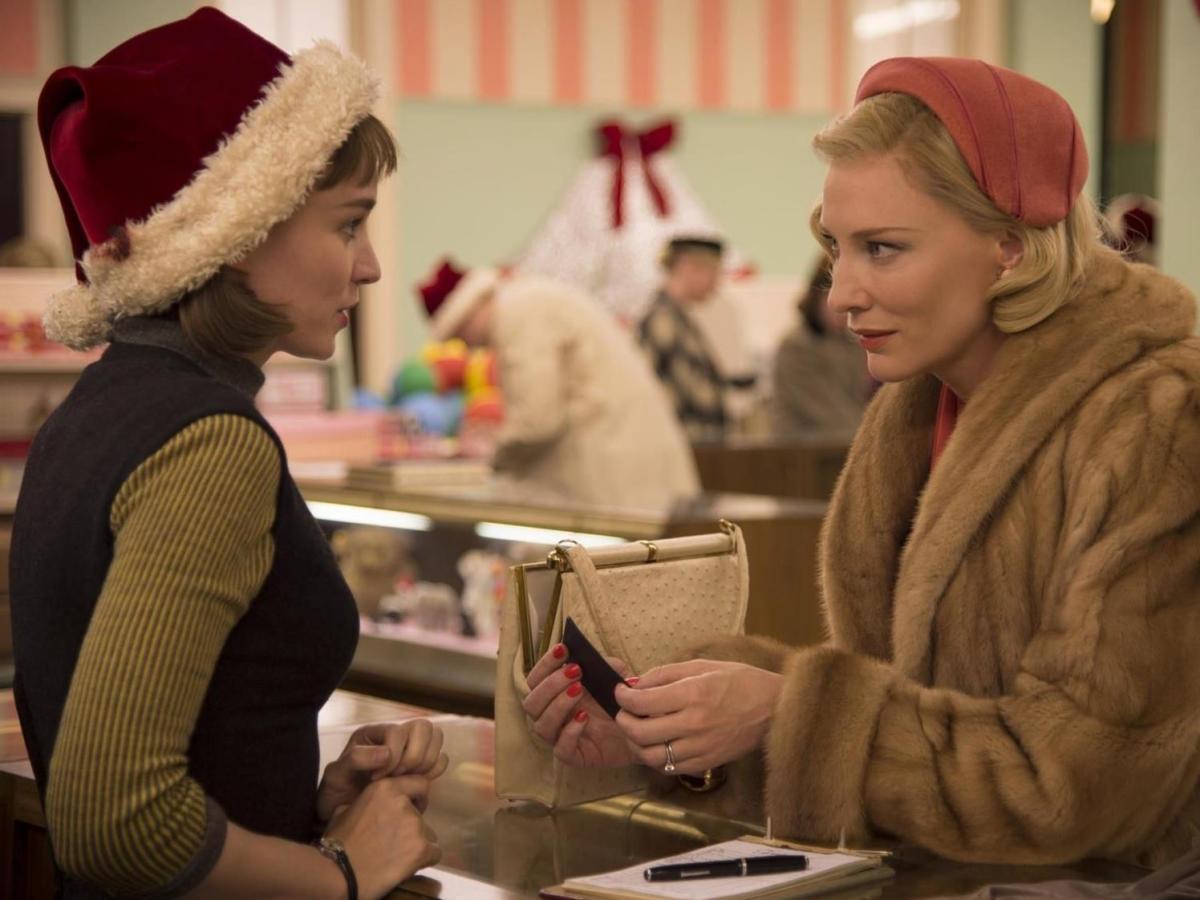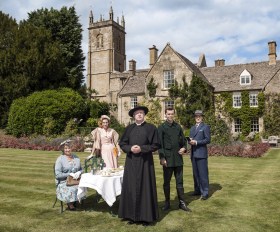In rendering life and love on screen, messiness in sentiment can beget the same in style and structure — or, it can heave against constrained confines. The latter case may appear more orderly, but it no less deeply felt; in the contrast between swirling emotions and the imposition of boundaries, be it family, societal or otherwise, is where sparks can fly. This is where the sumptuous, surging Carol resides, both the film and the woman who gives it its name. Also known as Mrs Aird (Cate Blanchett, Cinderella), she steps out of Patricia Highsmith’s 1952 lesbian romance novel The Price of Salt and into director Todd Haynes’ (TV’s Mildred Pierce) textured, tender, thoughtful and even triumphant cinematic vision.
With writer Phyllis Nagy (Mrs. Harris), Haynes makes her plight smoulder within order, mirroring the urges welling up inside the pivotal protagonist; however the feature isn’t hers alone. The title may indicate otherwise, but Therese Belivet (Rooney Mara, Pan), a shopgirl with dreams of becoming a photographer, is as much the movie’s point of focus as the elegant, enigmatic figure who will become her friend, road trip companion and more. In New York in the 1950s, the pair meet prior to Christmas over a department store toy counter, forging a bond over gloves left behind. Carol is in the midst of divorcing her husband Harge (Kyle Chandler, Bloodline) and fighting over custody of their four-year-old daughter Rindy (debutant Kk Heim), both started by an encounter with her pal Abby (Sarah Paulson, 12 Years a Slave), while Therese dates the kindly Richard (Jake Lacy, Obvious Child) yet avoids his proposal of marriage. Their amorous failings elsewhere inform a mutual attraction and connection neither can nor wants to hide.
Entering into their impulsive affair at a later moment, then jumping to the beginning of their acquaintance, adds layers of competing comfort and tension. That more will follow their first interaction is a foregone conclusion, yet the path proceedings will take, even while adhering to the forbidden love stable, is anything but obvious. Of course, Carol isn’t concerned about narrative surprises but emotional awakenings, as proves particularly applicable as its characters try to find the will to rally against their conservative environment, embrace their feelings despite the personal consequences, and stay — above all else — true to themselves. That’s where chaos reigns, crashing against a plethora of forces both within the tale and in its staging and performance that endeavour to deign otherwise.
Indeed, as if trapped in time with the feature’s period setting, Haynes’ stylistic approach is as magisterial and majestic as his unravelling of the story. Within warmly cream-tinted visuals, he demonstrates restraint in pace and polish in image akin to his space-centric Safe and masterful melodrama Far From Heaven, while remaining as rich as the more energetic and frenetic, music-oriented likes of Velvet Goldmine and I’m Not There — a delicate but rewarding balancing act. As shot on shot on Super 16 mm by cinematographer Edward Lachman (a veteran of the director’s last three film and television efforts), his penchant for framing through windows, doorways and mirrors — relevant equally to depictions of his two leads either together or alone as it is to shots that take the form of their gaze — proves an inspired method of depicting the scrutiny that haunts the characters, both internalised and externalised. In contrast, sometimes the close-ups audiences yearn for and luxuriate in and the movie lingers in, mimicking Carol and Therese’s reactions, threaten not to have the same stunning impact.
So it is that the pictorial account Carol offers often speaks louder than words, and is as crucial and revelatory as the dialogue that is and isn’t spoken, as well as the Carter Burwell (Legend) score that sweeps the tale along. Finding a way to introduce an additional mechanism of perception and inspection in the form of Therese’s favouring of a camera — in one of the screenplay’s many minor tweaks to the source, as opposed to her fondness for theatre set design in the book — is demonstrative of the film’s savvy and subtle construction that enhances the original material. Similarly, repeatedly inserting the key pair of would-be paramours in a position of distance, as placed in and often threatened with being engulfed by their surroundings, sensitively arouses their tentative status. As most filmmakers dream but few truly achieve, Haynes makes his exquisite, evocative frames a precisely painted canvas where every stroke of detail matters, resulting in an offering as ravishing as the feelings it toys with.
Such sophisticated artistry, such a seemingly effortless blend of emotion and aesthetics, always sits at the fore of the feature, though the skill of Haynes’ stars does its best to cast all adjacent minutiae into the background. Again, the movie’s moniker is misleading, for as magnetic as Blanchett is in flitting between an assured brand of enchanting and alarmed in the titular role, Mara’s hesitant yet enthralled younger woman remains every bit her equivalent counterpart. Aligned with the veiled world Carol and Therese must inhabit, in their own distinctive ways their quiet, melancholic portrayals channel the clash of disarray and neatness the film presents time and again, embodying the fragile and elusive concept the feature seeks from its methodical balance of disparate parts: a perfect whole. That’s what their characters mean to each other, and that’s what Carol becomes in so movingly, beautifully relating their aching desires.
Rating: 5 stars out of 5
Carol
Director: Todd Haynes
UK / US / France, 2015, 118 mins
Adelaide Film Festival
adelaidefilmfestival.org
15 – 25 October
In general release: 14 January 2016
Distributor: Transmission
Actors:
Director:
Format:
Country:
Release:





